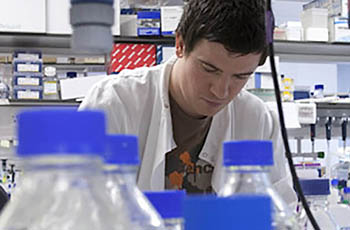
About us
We are a group of cardiovascular researchers at The University of Manchester who have been recognised by the British Heart Foundation (BHF) for focused research excellence in the area of integrative physiology.
Our research areas include the development of the heart and circulatory system, congenital heart disease, irregular heart rhythms, heart failure, high blood pressure and stroke.
Manchester has been awarded £1 million over the next five years by the BHF to accelerate our interdisciplinary science to world-leading status. This investment has been matched by the Faculty of Biology, Medicine and Health.
Our principal investigators, led by Professor Bernard Keavney, are united behind the common goal of working with the BHF to improve the prevention and treatment of cardiovascular diseases, enabling people to live free of the fear of heartbreak.
Our aims
We aim to:
- further develop a collaborative cardiovascular research community in Manchester, involving basic biological and clinical scientists, medical and allied health professionals, physical scientists and humanities scholars;
- promote multidisciplinary cardiovascular science in Manchester;
- support and develop future leaders in cardiovascular research;
- forge international collaborations, particularly with colleagues in low and middle income countries;
- engage with patients and the public at all stages of our research;
- work collaboratively with scientists in other institutions, particularly BHF-funded Centres;
- deliver translatable and transformational research outputs in cardiovascular disease.

Our research
Integrative physiology focuses on the integration of mechanisms and the regulatory functions that go wrong when disease occurs.
As part of this approach, we consider the human body as a functioning system of molecules, cells, tissues and organs. With a focus on the cardiovascular system, we combine expertise in genetics, molecular biology, pre-clinical models, and experimental medicine.
We have three research priorities within integrative physiology.
Cardiovascular genetics and development
We look for novel mechanisms of disease and new treatments in both single gene and polygenic cardiovascular diseases.
We use methodologies such as whole-genome sequencing and multi-omics in a variety of disease settings, particularly congenital heart disease, hypertension, and inherited channelopathies.
We are developing novel bioinformatic and molecular genetics methods to distinguish genetic variants that impact human health from the many 'innocent bystander' variants found in the genome.
Advanced imaging of genotyped patients with inherited cardiac conditions at the BHF Manchester Cardiovascular Magnetic Resonance Centre (launching in June 2020) and a collaboration with the Manchester Centre for Genomic Medicine will help us to identify new genotype-phenotype relationships, enabling personalised medicine for our patients.
Read more about this research area:
Cardiovascular physiology
We study underlying mechanisms of heart development, early life influences on cardiovascular diseases, heart failure, and cardiac arrhythmias from the nanoscale to the whole organism.
To do this, we use a full range of experimental models of disease including stem cell derived cardiac myocytes and preclinical animal models through to human samples and augmented by in silico modelling.
We investigate the normal and abnormal physiology of the cardiac conduction system - the heart's electrical wiring - and use molecular imaging to characterise the relationships between calcium signalling in the heart muscle and cardiovascular disease in patients.
Read more about this research area:
Hypertension and its consequences
High blood pressure is the most important global cause of illness and premature death.
We investigate the mechanisms through which high blood pressure becomes established, and search for new ways to prevent it from developing.
Our work focuses on the behaviour of small arteries in the body, which provide the most important regulation of blood pressure levels.
We also study stroke, particularly how inflammation following stroke worsens prognosis and how that can be averted using novel therapies. We implement research findings to promote best practice in stroke care in the NHS.
Read more about this research area:
Further information

Funding
We offer funding from the Accelerator Award to principal investigators working in one of our three priority areas: cardiovascular genetics and development, cardiovascular physiology, and hypertension and its consequences.
Principal investigators may support members of their group with their applications, where appropriate. You should specify which of our priorities your application falls under.
Funding will be allocated through the below schemes.

Accelerator Fellowships
Learn more about the scheme providing you with a personal salary and research consumable support for a limited period of two years.

PhD studentships
We are looking for projects that will allow us to offer three-year PhD studentships focusing on interdisciplinary training.

Pump-priming projects
We offer up to two-year pump-priming projects to be co-supervised by one cardiovascular and one non-cardiovascular PI.
